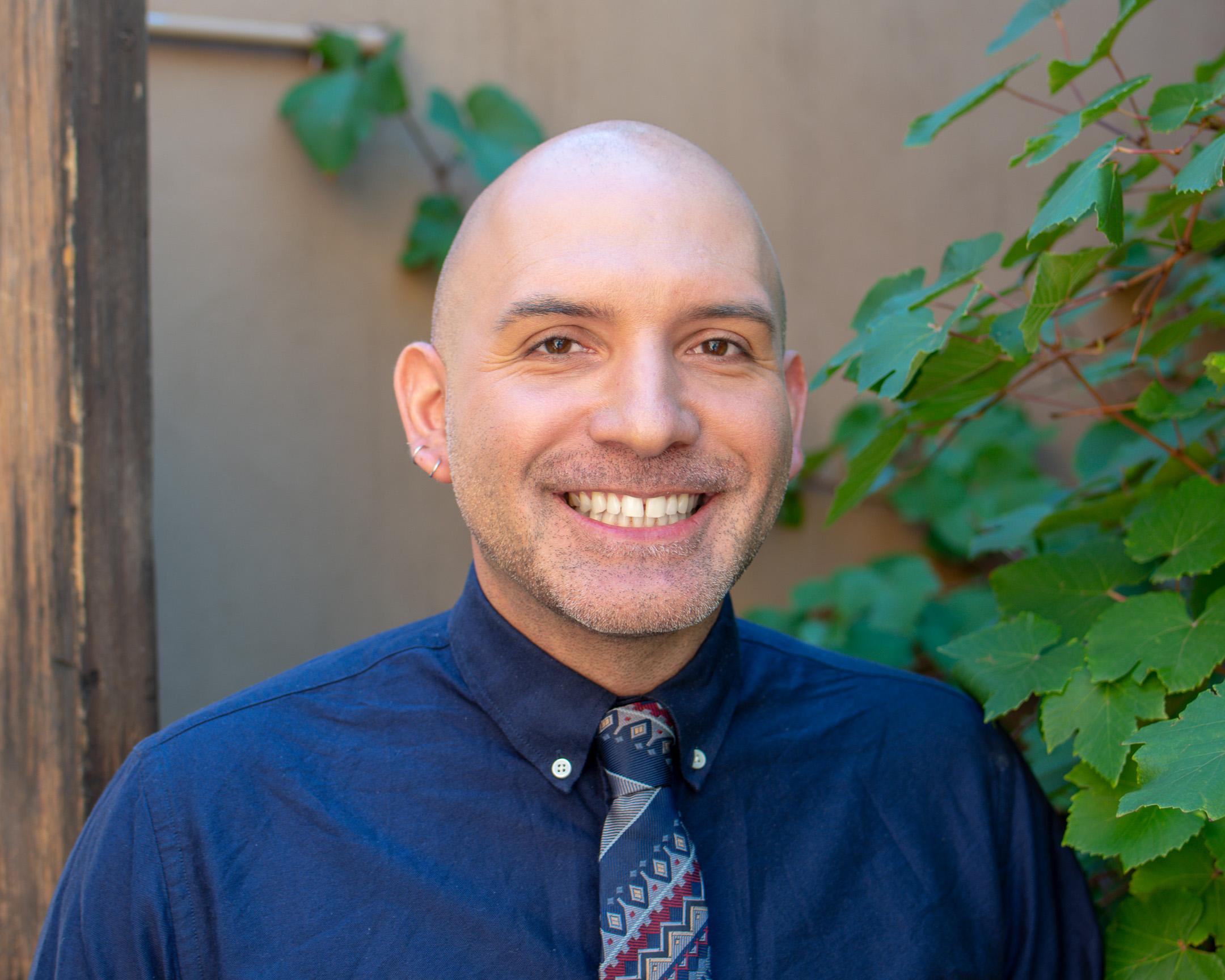The mission of SAR Press encompasses not only publishing research at the forefront of anthropology and Southwest and Native studies, but also providing resources to our past, present, and future scholars, as well as any scholar looking for more information about the publishing process. To that end, we are starting a new blog series comprised of interviews with diverse scholars including first-generation scholars and those from marginalized communities who have recently published or are in the midst of publishing their first book and who can offer guidance and encouragement to colleagues who are just starting to think about publishing. We hope that these interviews make a small contribution to supporting people as they begin the publishing process.
Our latest interview features John Arroyo, one of SAR’s 2018–2019 Mellon fellows. While at SAR, Arroyo worked on a book project titled “Shadow Suburbanism: Mexican Everyday Life and Fear in Greater Atlanta,” in which he analyzed the role that municipal-level institutions in suburban Atlanta (Gwinnett County) play in planning and designing for growing influxes of Mexican immigration since 2000.

Can you tell me a bit about who you are, where you are in your career, and what you study?
My name is John Arroyo, and I’m an assistant professor in engaging diverse communities in the School of Planning, Public Policy, and Management. I study urban planning, migration studies, Latino/a/x studies, and cultural policy. My research focuses on the social and cultural dimensions of immigrant-centered built environments. I also study the role of arts and culture in cities and environmental justice in communities.
What is your background as a scholar?
My background as a planning and migration scholar is directly informed by my experience growing up in East LA, in California, home to one of the largest Mexican and Mexican American populations in the country. I witnessed firsthand many of the housing, transportation, and public health issues that face Latino/a/x immigrant families. As I grew older, I wanted to play a role in improving those issues. I shaped a career in planning with communities of color because I had an interest in the spatial outcomes of this inequity.
Do you have other scholars or writers in your family, or were you the first?
I was the first person in my family to matriculate to higher education and obtain a PhD, and I was the first person in my family to move away for school. I moved from Los Angeles to Massachusetts, and that was a new struggle for me—trying to make a new life outside of my traditional support system but also seeing the range of Latino/a/x experiences on the East Coast and finding a new place within it.
Where are you in the writing and publishing process, and how did you get started?
I always wanted to write a book, and I knew that would come from my dissertation. When I first began writing my dissertation, I thought I could immediately start with a book format. What I didn’t realize is how the dissertation is written for a specific audience—for your committee—and how much rewriting and restructuring would happen along the way to make it into a book for a broader audience beyond your committee.
What has been the most challenging in the book-writing process is being comfortable with my own voice—to make the bold recommendations that I’ve wanted to make about new Latino/a/x settlement in the South and new immigrant destinations (specifically Georgia), a dynamic topic that is constantly in flux. I didn’t find the outreach and making connections with largely undocumented immigrant communities and advocates in my three years of research difficult; what I found more difficult was to write something that wasn’t time based as much as evergreen. I feel for anyone working on a book dealing with pressing issues right now—climate, race, and migration. After the outcome of the 2021 US Senate runoff in Georgia I sat with my book so far and thought, does this change everything now that Georgia is so different? Despite changes to the Senate, anti-immigration policy is still governed by various municipal, county, state organizations, and while scales sometimes change, this enforcement has been a problem regardless of administration. This book is truly about the lives of these people and how what has happened so far, policy or otherwise, has affected them and forced them to create shadow communities.
Another challenge has been thinking about whether or not the book belongs in a special series. I’ve seen various series about environment or race, and I’ve studied sociology. My goal for the book is for planners and policymakers to understand how they’re missing—essentially excluding—large, growing populations in their regions. The book will very well serve anyone studying geography, urban sociology, and cultural anthropology. I’ve been in various writing circles with people in different social science and humanities disciplines, and we’ve been able to push back and forth a bit. I also joined a group doing editorial coaching for book manuscripts.
Have you found a publisher yet, and if so, how did you go about doing that?
I attend many conferences and make appointments with publishers. I recommend looking at the conference program with an eye toward presses with a special series or general interest in your discipline. Sometimes editors will see the title of your presentation and will reach out directly, inviting you to meet and discuss your book project. Some presses are looking for full manuscripts; other presses are looking for just a chapter or a proposal. What I found useful during my time at SAR was using the second half of my Mellon Latino Studies Fellowship to work on my book proposal. I did a workshop with Pierrette Hondagneu-Sotelo, my SAR fellow mentor and 2017–2018 SAR Weatherhead fellow, and my cohort of SAR fellows. I don’t think my project would be where it is now if it hadn’t been for that workshop because no one teaches you how you write a book proposal or a book during graduate school. Some will finish their dissertations or do a three-paper series instead of a dissertation, but only those in tenure-track jobs will follow through with a book project.
I see a lot of people worrying about approaching editors or publishers and finding that intimidating. Do you have any advice?
I would be juidicous about the number of presses your send your proposal to. If you do your research on various presses and you know colleagues who’ve worked with various editors, someone will say, “I had a really wonderful experience with this editor,” or they’ll say, “This press has resources for doing some book talks,” or “They’ll pay for things like indexing or image copyrights,” which ends up being a deciding factor for some scholars who may not have research funds at their institutions. Or you’ll hear people saying this editor or this press is really committed to working with first-time authors, which is important for me—someone saying, “We know that you’re learning this process, we want to be a partner and we’re excited to celebrate new scholars and their work.” What I realized is if you consider your topic and you look at the presses’ work, there are probably only three or four presses that really fit. In the same way, when students apply to doctoral programs, there tend to be only a handful of places with the faculty and research to support your specific interests.
As I think back, one of the exercises I did early on with my writing group, which I thought was instrumental, was thinking about an avatar. Who are you actually writing this for? The exercise makes you imagine the full scope of your audience as you write. For example, I think of Vanessa, a professor at a big design or geography department . . . somewhere in the Midwest . . . who is teaching a class on race and space . . . I imagine them assigning the housing chapter of my book to their class for a lecture on immigrant placemaking and housing. You write a paragraph description of this person. You give this person a name; you have some background information, maybe where they studied, the things they’re interested in; and you keep their name on your monitor. Seeing Vanessa’s name helps me see who I’m writing for. What’s tricky, I think, is professors say that no one ever assigns a full book anymore, they’ll give chapters. So I think as a writer it’s hard to write every chapter with a little bit of a summary and context about the rest of the book without saying, “See chapter 1, already covered.” My hope is that someone sees the interconnections of my book in full. For example, in my project it would be difficult to cover immigrant ethnic retail conditions without understanding the context of Georgia’s history and evolution of immigration policy.
Do you have any other advice for someone who’s just starting out?
I’d say that the writing process, scholarship in general, can feel monastic and isolating at times. However, COVID has taught us that despite our disconnects with physical interaction, there are ways to connect with people that you wouldn’t normally connect with or have the resources to. I’ve seen an outgrowth of online writing circles, and for me it’s been really important to think about a writing habit, to do this work when I’m most fresh and creative. For me it’s early morning kind of work, for other people it’s late night or evening—and trying to stick to that schedule. A second thing I’d say is finding a way to be in conversation with other people, such as an online accountability group. I have two writing groups. The first meets for three hours a week every week, and I know that if I’m behind in writing, at least I have those three-hour chunks to try to catch up if something’s thrown off my week. The other meets for one hour at the end of the week. It provides a buffer to make-up any lost time during my “thirty minutes of writing a day” average.
I’d also say that there’s a large outgrowth in book-scrubbing or manuscript-scrubbing workshops for junior scholars. In the past those usually cost a few thousand dollars and would involve senior scholars coming to your institution. They’d read your manuscript in advance, and you’d spend a day and a half hammering out every chapter and making sure the final is ready to sending to the press. I think more and more people are getting used to doing this online, so I would recommend new scholars, early scholars like me, not shy away from asking for that time. You’ll see that senior scholars want to help new scholars, especially with all of the changes in higher education, and this could very well be a person who leaves a small review in the jacket of the book or becomes an external reviewer for the press. I think making those connections plays a bigger role for junior faculty because you just want to ground-truth your research. This is an opportunity to catch any final things before your book becomes reality.
This interview has been edited for length and clarity.
Find out more about SAR Press and order any of our books.
SAR has been publishing scholarship of the highest caliber for over one hundred years.

